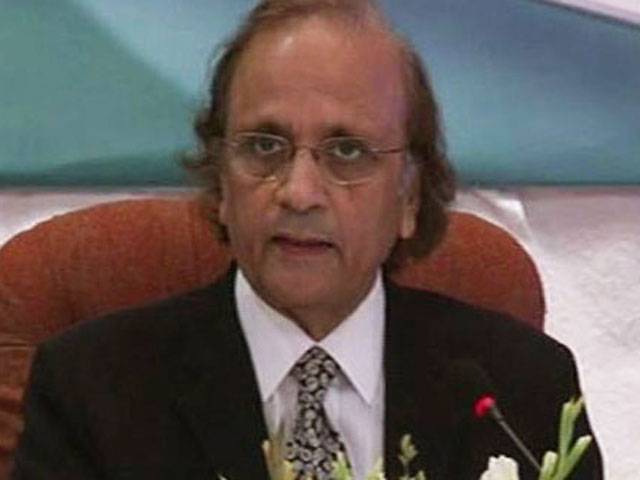ISLAMABAD - Salman Masood - Chief Justice Tassaduq Hussain Jillani appears to be an antithesis of his predecessor Iftikhar Muhammad Chaudhry. Justice Jillani has a gentle and mild demeanour compared with the steely facade of the former chief justice. It has been almost four months that Justice Jillani has assumed the mantle at the white marbled building of the Supreme Court, which post-2007 has emerged as a major power player in the country’s body politic. Justice Jillani has restrained from the excessive use of suo motu, a practice so excessively used by Chaudhry that it eventually become controversial. Justice Jillani has also shied away from media spotlight, a stark contrast to the display (and want) of pomp and show that was the hallmark of Chaudhry’s tenure. There has been no attempt by the chief justice to emulate the style of his predecessor, no confrontational outbursts against the executive. But scratch beneath the delicate surface and one finds the same resolve to uphold the independence of judiciary and supremacy of constitution that came to define the lawyers’ movement and subsequent Chaudhry tenure as CJ.
In what can be seen as the first major public address, Justice Jillani earlier on Friday laid out his vision when he spoke at a function marking the retirement of Justice Khilji Arif Hussian in Islamabad.
In essence, it was no different than Chaudhry’s.
Justice Jillani vowed to protect democracy and enumerated on the number of challenges that the country faces — terrorism, violence against minorities and abysmal human rights conditions —and stressed that the Supreme Court, which he described as a pillar of the state, will stand tall and firm to address these daunting problems. Justice Jillani reiterated that the constitutional demarcations, as enshrined in the constitution, must be respected and any overstepping will not be tolerated. More importantly, Justice Jillani warned against curbing of civil liberties in the name of national security. At a time when most of the opposition political parties are clamouring against the Protection of Pakistan Bill, the statement by Justice Jillani is indeed important. Opposition politicians have termed PPB a ‘gross violation of fundamental human rights’ and vowed to block its passage through the Senate. The Chaudhry court gained its initial fame — and some would say invited friction with the military — when it took up the case of enforced disappearances. The security forces, on their part, have long rued the weak prosecution system and lacunas in the legal framework as factors that let militants off the hook easily and escape accountability. Such holes must be plugged but any such legislation must not trample over basic civil liberties — and Justice Jillani rightly pointed out that there is need to strike a proper balance between individual rights and security of the state.
This urge for balance seems to be the driving force behind Justice Jillani’s tenure, which is subtly reorienting the court from being ‘individual-specific’ to ‘institution-specific’.
Each chief justice endeavours to leave a mark and ensure a lasting legacy. Justice Chaudhry gave the court a populist appeal and resolutely defended its independence and autonomy. Justice Jillani, as was evident from his speech, plans to carry the same legacy forward, in his own style and subtle tenor, but he would also do well if he ensures that justice is properly dispensed at the country’s overburdened and under-performing lower courts, which are rife with corruption and inefficiency. Till that time, the story of judicial independence and achievement would remain unfulfilled and incomplete.
The writer is Resident Editor, The Nation in Islamabad.
Wednesday, April 17, 2024
A gentle but firm face of the judiciary
| Chief Justice Jillani might appear different from his predecessor but holds the same values

Caption: A gentle but firm face of the judiciary
8:54 PM | April 16, 2024
8:53 PM | April 16, 2024
Pride and hype as F1 roars back to China after Covid absence
10:36 PM | April 16, 2024
No let-up in Karachi street crime incidents
10:35 PM | April 16, 2024
Stock market today: Most of Wall Street weakens again as Treasury yields rise more
10:34 PM | April 16, 2024
Muslim K-popstar Daud Kim buys land to build mosque in South Korea
10:33 PM | April 16, 2024
Punjab Stadium unavailability derails National Challenge Cup 2023 Final Round
10:28 PM | April 16, 2024
Political Reconciliation
April 16, 2024
Pricing Pressures
April 16, 2024
Western Hypocrisy
April 16, 2024
Policing Reforms
April 15, 2024
Storm Safety
April 15, 2024
Democratic harmony
April 16, 2024
Digital dilemma
April 16, 2024
Classroom crisis
April 16, 2024
Bridging gaps
April 16, 2024
Suicide awareness
April 15, 2024
ePaper - Nawaiwaqt
Advertisement
Nawaiwaqt Group | Copyright © 2024





